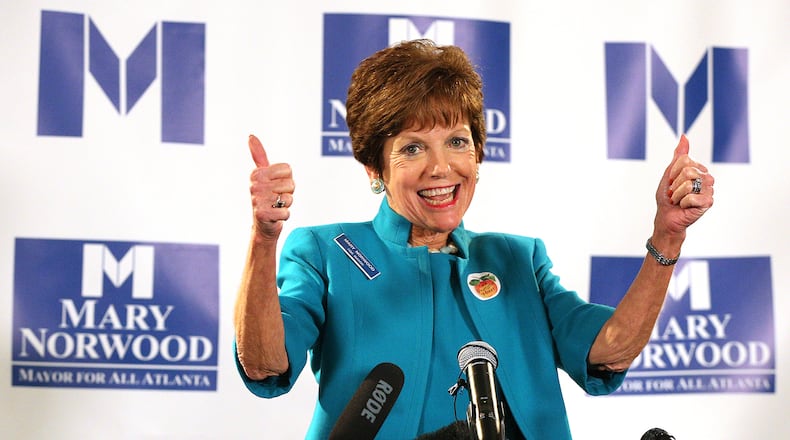Councilwoman Mary Norwood lost the Atlanta race for mayor in 2009 by about 700 votes, and she's spent much of the last eight years preparing for another bid. After a second-place finish in Tuesday's vote, she'll have that second chance.
The next month will feature many callbacks to that 2009 tangle with Mayor Kasim Reed, whose narrow victory set him on a course to become one of the state’s most prominent Democrats. After all, Norwood will face Reed’s hand-picked successor – Councilwoman Keisha Lance Bottoms – in the Dec. 5 runoff.
And much of the debate over her electoral hopes will hinge on a divisive question that loomed over her last run for Atlanta's top job: Is the city ready for its first white mayor since 1973?
Atlanta's demographics and economy has changed dramatically since that last wide-open mayoral contest, when the city was struggling with the aftershock of the Great Recession and its coffers were in dire straits.
Tens of thousands of newcomers have moved to the city since then, the racial gap between white and black residents has narrowed, and a string of new economic development deals have Atlanta leaders buoyant about the prospects of landing the biggest one yet: Amazon and its promise of 50,000 new jobs.
Norwood’s strategy has also been tested in new ways since her last run. She finished that contest with 46 percent of the vote, a few thousand votes shy of an outright victory against three main rivals. In the runoff, Reed notched his narrow victory with ample help from state Democrats and left-leaning groups.
“It’s going to be a radically different race than my race,” said Reed, adding that he trailed Norwood by double-digits shortly after the first-round of voting in 2009. “They’re going to be starting off, in my opinion, relatively close.”
In this contest, Norwood has been the presumptive front-runner from the moment she announced her candidacy, but her base of support has been squeezed from both ends as she faced a more crowded field than her 2009 run.
Peter Aman and Cathy Woolard, two white rivals, relentlessly took aim at her north Atlanta constituency, casting her as an uninspired and ineffective politician. Her support among black Atlantans, always a source of pride, dropped as Reed and several of the black candidates upped their attacks.
At the same time, the Democratic Party of Georgia ratcheted up the pressure earlier.
In the last race, the party spent more than $165,000 assailing Norwood in the runoff. In this one, state Democrats launched the first attack in October, painting her as "Mary the Republican" and warning that she could be the first non-Democrat to win the city's top job since 1881.
Norwood, a self-described independent, has tried to take the attacks in stride. She's ignored chances to pummel her opponents – in one memorable debate, she teed up a soft-ball question at one of her rivals – and has sought to address her initial struggles over President Donald Trump.
She tells audiences that she voted for Democrat Hillary Clinton in last year’s election, but that her solid standing with conservatives – polls showed she dominated among Republicans – shows she can work across the aisle.
And she'll try to leverage the same knack for showing up at events across the city that helped make her a popular councilwoman. Speaking in third-person at her campaign party late Tuesday, Norwood told her supporters to expect in a runoff that "Mary will once again be everywhere in the city.”
As for the attempt to paint her as a "closet Republican" running in a deep-blue stronghold, Norwood countered with a list of Democratic and independent supporters on her own website, which she called "Georgia Dems for Mary."
Still, this race has complicated her strategy. Norwood’s double-digit lead in early polls evaporated as Aman and Bottoms gained steam. And Reed’s endorsement of Bottoms – and aggressive use of his political pulpit to blast her rivals – has helped Bottoms consolidate Democratic support.
Over the next four weeks, she’ll face more sustained attacks from Reed, Bottoms and the state’s Democratic machinery. And she’ll be looking for any chance she can to highlight support from outside the GOP establishment.
“Look at Mary’s attendees for her victory party,” said Jeremy Collins, an Atlanta Republican who nodded to her black, Hispanic and Asian supporters in a cramped ballroom. “She has a diverse coalition that’s representative of a truly independent campaign for all Atlanta.”
Norwood's campaign also hopes the mayor's outspoken role could come back to haunt her opponent: Reed has slammed many of the also-rans that Bottoms needs in December. And Norwood is sure to step up their appeals to them in the coming month.
That could be a tough case to make. In interviews with more than a dozen voters on Tuesday, several of Bottoms’ detractors in south Atlanta signaled they would probably vote for her in the runoff against Norwood.
Lillian Rainwater, an 88-year-old retiree, said her top priority is backing a Democrat in the race. Asked if that was a knock against Norwood, she responded: “I’m a Democrat, and I’m just not going to vote for a Republican.”
James Hodo, a 73-year-old disabled veteran, said his top picks were former state Sen. Vincent Fort and City Council President Ceasar Mitchell. Asked about Bottoms, he said, “she’s not ready for it.”
“But I’ll have to vote for her if there’s a runoff,” he added as he stood outside a southwest Atlanta precinct. “She understands the city’s problems, at least.”
About the Author



